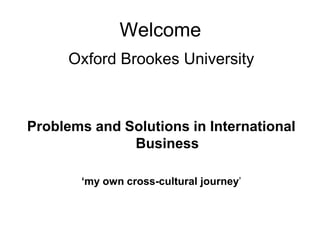Oxford brookes international business
- 1. Welcome Oxford Brookes University Problems and Solutions in International Business ‘my own cross-cultural journey’
- 2. My work/life journey • Boarding School – ‘O’ Levels • College –‘A’ Levels/Art Foundation • University – Degree – Textile Technology • 1st Job – Next plc Job • 2nd Job – Liz Claiborne UK/Portugal/Israel/Sri Lanka/ Hong Kong/China • Self employed • Passions – Travel, International and National Heritage, The Wonders of the World
- 3. My stories… • Kissing the other cheek… • Shaking hands… • The loaves of bread… • Business cards required…
- 4. Why are Intercultural skills useful? • Global world/business • Work with people from other cultures • Travel to or live in other countries as part of job • Be responsible for multicultural/global teams • Communicate effectively with colleagues from different cultural backgrounds. • Develop effective cross-cultural business relationships. • Successfully manage a multicultural team and get the best results from them. • Organise a successful overseas business trip.
- 5. History of Intercultural Awareness History: • 1950-60 – British Life and Institutions • 1970-80 – Cultural Studies • 1990 – Cross-cultural communication • 21st Century Intercultural Awareness/Intercultural Working 5 Key thinkers: • E T Hall • Geert Hofstede • Fons Trompenaars • John Mole • Richards D Lewis What is culture? ‘Collective programming of the mind’ (Geert Hofstede)
- 6. Intercultural Training • Be aware of your own culture • Learn about others culture and preferences • Understand & adapt your style to work with others
- 7. What is culture? • What Is Culture - The customs, beliefs, art and all other products of human thought made by a particular group of people at a particular time. • What is Culture Shock - Disorientation felt by a person subjected to an unfamiliar way of life. Unless you know the rules of other cultures you could make serious errors of judgement resulting in insulting your host or even starting an International crisis! • Here are a few general cultural differences to be considered: • Greetings • Communication Style • Personal space • Eye contact • Views of time • Gestures • Taboos
- 8. The Iceberg Voice Shocks Appearance Surprises Body Language Behaviour Exceptional Behaviour Attitude Values Beliefs Motivators Drivers Standards We need to know something about all 3 zones to safely navigate these cultural icebergs
- 9. Tips for International Business • Be aware of who you are meeting or dealing with. • Learn the business etiquette required for a new situation. • Use clear and easily understood International English. • Be interested and ask questions.









